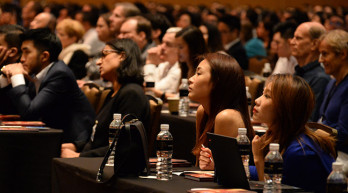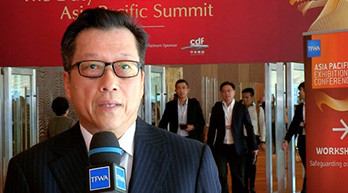

Two important background factors affected this performance. Firstly, the industry’s potential customer base continued to grow, and secondly, global economic activity strengthened in 2017, with global output estimated to have grown by 3.8%.
However, there is still a need for positive change in the industry, Juul-Mortensen continued. This is firstly because business prospects remain fragile. In addition, the pressures on the industry have arguably never been greater. In recent months, the potential damage of the airport business model’s heavy demands upon concession operators has been felt especially strongly in the Asia Pacific region.
Thirdly, said Mortensen, the industry’s value proposition remains under threat, as the growth of m- and e-commerce results in ever greater price transparency. Today, the duty free and travel retail business is embracing digital as the key driver enabling it to connect with customers seamlessly and continuously. New rules do not mean extinction of the kind of retail the industry is based on. In fact, evidence suggests that domestic retail is far more under threat, but the impact of m-commerce is dramatic and duty free and travel retail needs to quicken the pace of evolution and adapt more quickly to the new trading environment.
Following on from Juul-Mortensen, Andrew Ford, President, Asia Pacific Travel Retail Association, updated delegates on the many initiatives currently being undertaken by the Association to defend the industry against threats from many quarters. This included fighting the WHO Illicit Trade Protocol, amid claims of product leakage from the duty free and travel retail trade.
Adam Cheyer, Co-Founder and VP Engineering at Siri Inc., and Co-Founder and VP Engineering of Viv Labs, stated; “In this decade, artificial intelligence has produced results that I never thought I would see in my lifetime.” Among the advances he cited were the development of the Siri app in 2010 – for which he was responsible - the pace of development in robotics and dramatic improvements in technologies to diagnose cancer. We are, he stated, on the precipice of a paradigm scale shift in computing experience. AI will become the primary form of interaction for every consumer and every business, and “the Assistant” will evolve to become the next web. It is up to all of us, he concluded, to think about how this will impact our business in the coming years.
Shivvy Jervis, futurist and expert on the digital economy, said that travellers want experiences that are seamless, and outlined technologies that could allow the duty free and travel retail industry to create more meaningful engagement. Mixed reality, combining VR, AR and touch could, she said, break the barriers between the digital and physical world. Giving passengers the ability to touch as well as see upcoming products, for example, would allow airports to create ad campaigns with enormous appeal. Emotive AI, using digital humans that could interact with passengers, would pave the way to creating connections beyond those which can be achieved via an app.
Time to talk technical
The second plenary session of the day looked at how future development within duty free depends not only on the successful adoption of new technology, but also on a fundamental review of the business model.
Filippo Bianchi, Partner and Managing Director Boston Consulting Group, explored the reasons why the duty free and travel retail industry will grow. Firstly, it is a data-rich environment, secondly it has a predictable customer base, and thirdly it offers a unique pricing value proposition. The GTR market had, he said, a "food chain" mentality, but there is much to be gained by operating as an "ecosystem".
Ignace van Doorselaere, Chief Executive Officer of Neuhaus, addressed the question of how the industry can combine cash generation with unforgettable moments for the traveller. Good decisions are, he said, based on EBITDA and/or experience. However, in order to create “moments”, the industry needs to find the right mix between the two.
Sunil Tuli, Managing Director King Power Group (HK), opened a high-powered panel discussion to continue the session. Emmanuel de Place, Chief Operating Officer, Lagardère Travel Retail Asia Pacific, stressed the need to shift KPI from spend per passenger to global sales. It may be that our customers are not “captive” any more, but we have, he said, plenty of opportunities to catch them.
Aer Rianta International Chief Executive Officer Jack MacGowan said that it was in the nature of a landlord to extract as much rent as they can and take as little risk as possible, but what brands and retailers have to do is present a picture that is more attractive. Exploring ways to combat leakage to other channels would, he believes, be the most convincing way to encourage airports to do something different.
Keith Hunter, Co-founder of Hunter Palmer Global Retail Solutions, stressed that while revenue is always going to be key, we need to put the customer at the heart of everything we do. If the wrong concession deal is in place, everyone will suffer, he stated, and the quality of the customer experience is negated completely.
When asked if airports were “the sharks of the value pool”, Scott Collier, Vice President, Customer and Terminal Services Greater Toronto Airports Authority, said that airports will have the courage to change if brands and retailers are equally willing. We should all be aiming to create the best airports we can, and if we agree on that, airports will be prepared to think about things differently, he stated.
Seamless shopping
The day continued with a series of workshops. The first, entitled Seamless shopping: Travel Retail’s Frictionless Future, looked at how the rise of e- and m-commerce has forced traditional modes of retail to rethink the services they offer to shoppers. Consumers increasingly expect convenience, integrated payment systems and total flexibility.
Sunil Tuli, Managing Director of King Power Group (HK), said frictionless shopping puts the consumer in control, and means taking the opportunity to get rid of anything that doesn’t add value to the shopping experience, such as paper receipts and making the consumer rummage in the wallets for loyalty cards. Airports can no longer rely on travellers choosing to spend their spare time browsing, he said, and a significant 75% of passengers now plan their purchases beforehand.
The three micro “moments that matter” were detailed by Xin Deng, Managing Director of Global Smiling. Firstly, the customer looks for ideas about what to buy, then they consider which product is the best, and finally they want to buy. While many retailers focus on this last phase, it is less important for a customer to be present in the store than for the store to be present at each of these retail moments, he said.
Matthew Brennan, an expert on WeChat and Co-founder of China Channel, stated that technology was now augmenting traditional retail. While people were accustomed to speaking of online to offline, today online and offline sales channels are merging, and in China, the retail giants are now moving offline. Mobile payment has moved into the mainstream and half of people in China don’t carry cash.
Playing the Game
Workshop B, Call of Duty Free: Gamifying Travel Retail analysed the implications of gamification for the duty free and travel retail industry. It explored how getting people to play and have a fun experience will mean customers are more likely to make purchases and ultimately become loyal customers. Paul Bulencea, Co-Author of Gamification in Tourism and Chief Experience Officer at Dziobak Larp Studios, said that when people are intrinsically motivated to do something, it engages them. Experiences are, he said, what we crave and retailers need to see customers as participants and not consumers.
According to Lewis Allen, Director of Environments at Portland Design, consumers live in parallel worlds. There is the physical world, but there is now also the digital world. This means that in an airport, the consumer is only partly there, as their attention is somewhere else in the virtual space. Retailers therefore need to use gamification to attract the consumer’s attention. Consumers are already enjoying gamification as part of their everyday lives, and eBay, for example, is essentially a game for people to win, he suggested.
Gamification is not just fun, its one of the most effective ways to engage customers, agreed Jessica Lau, Travel Retail Area Manager China and Taiwan of Guerlain. Her company’s WeChat gamification campaign behind the KissKiss Matte lipstick line attracted more than 10,000 users in one day. The key to success for luxury brands is, she concluded, to deliver high enjoyment which will mean players will be excited to share their experience.
The threats and how the industry is fighting back
Safeguarding our Industry, the third workshop, took a closer look at the challenges that will have an impact on the future of the industry. Patti Chau, Regional Director, Airports Council International, Asia-Pacific, spoke of the need for airports to become more diversified when it comes to revenue, particularly in the non-aeronautical sector. She cited ACI’s estimate that as many as 66% of airports worldwide operate at a loss, and that retail concessions, which account for 28.8% of non-aeronautical revenue, are vital if that statistic is to be improved.
Building on the theme of developing traffic trends, Jameson Wong, Director of Business Development APAC at travel analyst Forward Keys, said that China’s market will grow a healthy 8.9% between May and July, while overall, international departures from China are forecast to be up by over 21%.
Michael Barrett, Executive Officer, Asia Pacific Travel Retail Association (APTRA), addressed the challenge of differentiated regulation. While the industry is a unique sales channel, not all governments appreciate this. If domestic regulations are applied to duty free, he said, the risk is that these will then be introduced to other markets without understanding the need of the broader implications on airport revenues. He also spoke of the increasing regulatory scrutiny on duty free and travel retail as a sales channel, particularly on labelling and marketing.
His message was underscored by Sarah Branquinho, President of ETRC and External Affairs Director at Dufry, who said that it is impossible to meet the local language requirements on labelling. Creating a digital solution would allow for a cross-category approach, provide a multilingual platform, and would be an easy format for consumers to use, she commented.



